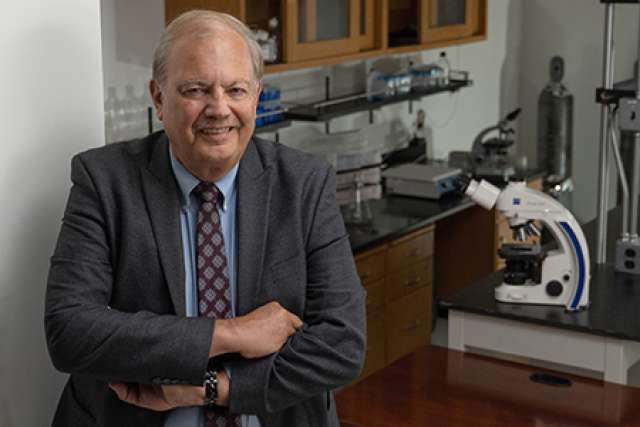Combining the molecularly targeted therapy Herceptin with chemotherapy in women with early stage breast cancer significantly improves disease-free survival for patients with a specific genetic mutation that results in very aggressive disease, a top UCLA researcher reported Thursday.
Dr. Dennis Slamon, whose laboratory and clinical research lead to the development of Herceptin, reported results of the Phase III study of more than 3,200 women Thursday at the 29th annual San Antonio Breast Cancer Symposium.
The three-armed study compared the standard therapy of Adriamycin and Carboplatin followed by Taxotere (ACT), an experimental regimen of Adriamycin and Carboplatin followed by Taxotere and one year of Herceptin (ACTH), and an experimental regimen of Taxotere and Carboplatin with one year of Herceptin (TCH).
The study tested Herceptin with and without Adriamycin, an anthracycline commonly used to treat breast cancer but one that, when paired with Herceptin, can cause permanent heart damage. Researchers wanted to determine whether they could provide a therapy as effective as ACTH without the resulting cardiac problems. The study, Slamon said, showed that the women who did not receive Adriamycin did just as well as those who did, and they experienced a five-fold decrease in significant heart toxicities compared to those who got Adriamycin. Also, some women in the ACTH arm developed leukemias, while none of the women on the non-Adriamycin arm did, Slamon said.
"This study demonstrates unequivocally that the best treatment for early stage HER-2 positive breast cancer is obtained with a non-anthracycline regimen, TCH, that avoids the significant cardiac damage found when Adriamycin is used with Herceptin," said Slamon, director of clinical/translational research at UCLA's Jonsson Cancer Center. "This trial should impact the way early stage breast cancer is treated, with TCH being considered the preferred option."
Herceptin is effective in women with HER-2 positive breast cancer, about one in four diagnosed with the disease every year or about 250,000 women annually worldwide. HER-2 positive breast cancer is more aggressive, results in a poorer prognosis and shorter survival times, said Slamon, who discovered the link between HER-2 positivity and aggressive breast cancer in 1987.
Conducted by the Breast Cancer International Research Group (BCIRG), the study enrolled 3,222 women with early stage breast cancer between April 2001 and March 2004. Patients were randomized to one of the three arms. Slamon's report is the second interim analysis at a three-year median follow-up of the study data.
The study shows a survival advantage for patients in the Herceptin-containing arms, with 92 percent of patients on ACTH and 91 percent of patients on TCH still alive at four years compared to 86 percent in the ACT arm. Risk of death was reduced by 40 percent among patients in the ACTH arm and 33 percent in the TCH arm, Slamon said.
The study's primary endpoint was disease-free survival, but it also measured overall survival, safety, including cardiac toxicities, pathologic and molecular markers and quality of life.
"Now we know we can provide a very effective therapy for women with early stage breast cancer that reduces by five times the risk of heart damage," Slamon said. "And we've shown that women with HER-2 positive early stage breast cancer benefit from Herceptin therapy in that it significantly improves their disease-free survival times."
Herceptin/Avastin Study Results Revealed
Also presented at the San Antonio Breast Cancer Symposium were results of a promising Phase II study that combined two molecularly targeted therapies to treat advanced breast cancer without using conventional chemotherapy.
The study, done at UCLA's Jonsson Cancer Center and in an affiliated network of oncology offices, tested Herceptin with the angiogenesis inhibitor Avastin, which cuts off the independent blood supply that a tumor creates to help it grow and spread.
The study enrolled 37 women with breast cancer that had spread to other organs, the hardest type to treat effectively. Results indicate that 83.8 percent showed a clinical response, Slamon said, meaning their tumors completely disappeared, shrunk in size by more than 50 percent or remained stable - meaning their cancers didn't progress.
"This represents the next generation of studies we're trying to develop at UCLA, which take chemotherapy completely out of the picture," Slamon said. "This is the first study that takes us in that direction and we think we may be ready to try this in the adjuvant setting. These responses are as good as anything we've seen in this group of patients, even with our best chemotherapies."
Survival Increased in Early Stage Breast Cancer After Herceptin-Chemotherapy Treatment

The Lasker Award, to be presented to Dr. Dennis Slamon on Sept. 20, is widely regarded as America's top biomedical research prize.
Related Content
Articles:
Services:
Physician
Share:



